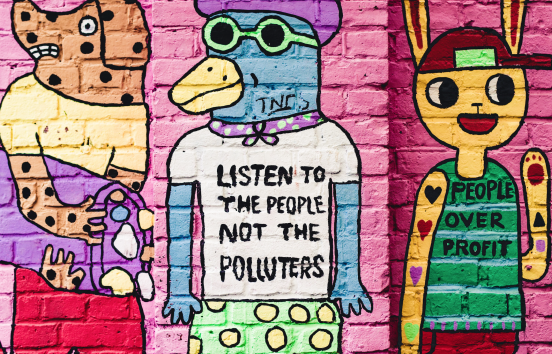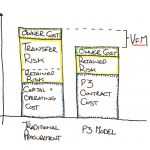In modern discourse, the terms “sustainability” and “sustainable development” are frequently used interchangeably and often reflect differing interests on a similar topic. John Robinson points out that “while government and private sector organizations have tended to adopt the term sustainable development, academic and NGO sources have been more prone to use the term sustainability in similar contexts” (Robinson, 2004). This trivial, grammatical discrepancy between terms prevents the formation of an absolute definition which may actually benefit the overall problem by creating what Robinson calls “constructive ambiguity”. Leaving the term abstract prevents the exclusion of “those whose views were not expressed in that definition” (Robinson, 2004).
Sustainable development is inherently utilitarian as it suggests institutional changes to reduce the social and environmental impacts of indefinite growth. For this reason it can be considered a techno-fix under the umbrella of ecological modernization; which works to re-tool societal relationships “to achieve a more sustainable relationship with the environment and ecosystems without compromising the quality of life delivered by industrial economies” (Harper & Fletcher, 2008). Sustainable development assumes that limits to growth can be overcome by increasing efficiency and reducing the throughput of energy and resources (getting more from less). In this sense, sustainable development can be viewed as a way to treat only the symptoms of larger and deeper sociological problems (Robinson, 2004).
In Canada the government acts as a “landlord and development proponent” (Hessing et al., 2005) which allows active participation in resource and environmental policy systems. Because of this active involvement of the state, they are prone to preserve a policy framework that maintains “ongoing federal presence in the regulation of resource activities” (Hessing et al., 2005). Industry is also firmly embedded into the policy system and in some arenas the government may be dominated by the members of industry. This core interest involvement of primarily regulators and regulatees, has led to a “satisficing” strategy based on incremental adjustment rather than encouraging a comprehensive paradigm shift to the policy process, and has worked to minimize the participation of other interest groups and the public as a whole.
This predisposition to preserve a traditional policy framework that maintains core interests and excludes public interests is most evident during the agenda-setting, and the decision making stages of the policy cycle. The most widely used model for agenda setting by the Canadian government is that of inside initiation, where “influential groups with special access to decision makers initiate a policy and do not necessarily want it to be expanded and contested in public for technical/political reasons” (Hessing et al., 2005). Because agenda-setting is the first phase of the policy cycle, it sets the stage for the steps that follow. By excluding the public from the beginning, the core interests maintain a partial advantage over the interests of the public.
During the decision making process there is also a tendency to exclude interest groups and the public. The complex structure of the decision making process tends to maintain their exclusion. “These factors conspire against the development of new policies that differ substantially from the status quo” (Hessing et al., 2005), and also lead to the development of incremental adjustments.
For these reasons, the shift in policy toward sustainable development has been primarily an attempt by core interests to maintain control over the environmental agenda. A true shift in priorities and goals would require “a fundamental transformation of underlying values and attitudes” (Robinson, 2004) to treat the deeper sociological problems, rather than merely the symptoms.
Literature Cited
Harper, C., & Fletcher, T. (2008). Environment and society: Human perspectives on environmental issues (Canadian ed.). Pearson Canada Inc., Toronto, ON, Canada. Print.
Hessing, M., Howlett, M., & Summerville, T. (2005). Canadian natural resource and environmental policy: Political economy and public policy. UBC Press, Vancouver, BC, Canada. Print.
Robinson, J. (2004). Squaring the circle? Some thoughts on the idea of sustainable development. Ecological Economics 48: 369-384.





